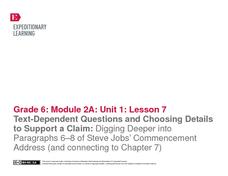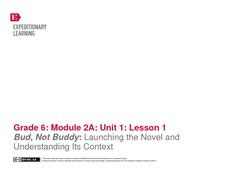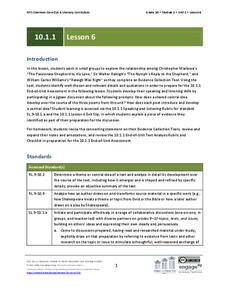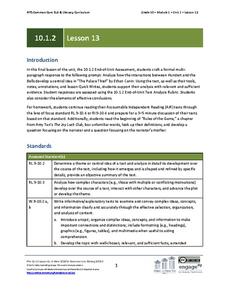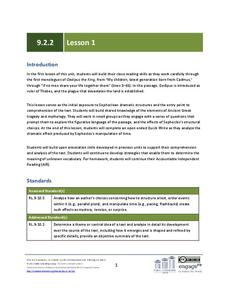EngageNY
Text-Dependent Questions and Choosing Details to Support a Claim: Digging Deeper into Paragraphs 6–8 of Steve Jobs’ Commencement Address (and connecting to Chapter 7)
Readers learn how to choose specific details drawn from a primary source (Steve Jobs' 2005 Stanford University commencement address) to support an analysis of informative text.
Missouri Department of Elementary
Are You Balanced?
Balance scales create a strong visual of how an individual prioritizes one's self alongside their commitments to the community, school, and home. Scholars complete a graphic organizer then discuss their findings with their peers. A...
Curated OER
Lesson: Elizabeth Peyton: Artist's Community: The Real
What is real or imagined? The lines of beauty reality, and imagination are blurred in Elizabeth Peyton's portraits of her community. Learners analyze her use of artistic technique in conveying real and imagined communities. They then use...
Curated OER
Printmaking
Analyze the process of printmaking and explore how prints reflect an artist's view of society. After viewing and analyzing the prints of Elizabeth Catlett, class members create an inner tube and a linoleum block print. They then research...
Sargent Art
Symmetry: A Design Problem
As part of a study of design, young artists examine an example of a formal (symmetrical) design and then, following step-by-step directions, create their own.
Denver Public Schools
Kung-hsi Fa-ts' ai! – A Chinese New Year Celebration
Looking for ideas for your Lunar New Year celebration? Check out an interdisciplinary unit of study that includes lessons in counting, calligraphy, culture, geography, literature, art, and music. Kung-hsi Fa-ts' ai! (May you...
EngageNY
Text-Dependent Questions Text-Dependent Questions and Making a Claim: Digging Deeper into Paragraphs 12–14 of Steve Jobs’ Commencement Address (and connecting to Chapter 9)
Readers draw connections between Bud, Not Buddy and Steve Jobs' 2005 Stanford University commencement address and cite evidence from the two texts to support their analysis.
EngageNY
Bud, Not Buddy: Launching the Novel and Understanding Its Context
The first lesson plan in a unit that uses Christopher Paul Curtis' award-winning depression-era novel, Bud, Not Buddy, as the anchor text establishes the routines that will be used throughout the unit.
MENSA Education & Research Foundation
Hurricanes
Learn the ins and outs of hurricanes through a series of lessons answering, "What is a hurricane? How does it travel? How is one formed, measured, and named?" Information is presented through informative text and images, while...
EngageNY
Grade 9 ELA Module 1, Unit 1, Lesson 12
Finding the central idea in a text can be as simple as deciphering the correct pieces of supporting evidence. As your class reads Stage 4 of "St. Lucy's Home for Girls Raised by Wolves" by Karen Russell, they analyze the interactions...
EngageNY
Grade 11 ELA Module 4 Overview
The intricate craft of narrative writing can make a happy story feel exuberant or a sad story feel devastating. With 42 extensive lessons that include poignant discussion questions, standards-aligned self-reflections, engaging writing...
EngageNY
Grade 10 ELA Module 1: Unit 1, Lesson 6
Wrap up your literary analysis unit with a discussion activity as tenth graders prepare for an end-of-unit assessment. After they have read and annotated Christopher Marlowe's "The Passionate Shepard to His Love," Sir Walter Raleigh's...
EngageNY
Grade 10 ELA Module 1: Unit 3, Lesson 2
Sometimes, sensory details can bring you back to a familiar place. Study the setting descriptions from a critical chapter in Amy Tan's A Joy Luck Club, and discuss how they enhance the book's plot and contribute to a central theme.
EngageNY
Grade 10 ELA Module 1: Unit 3, Lesson 11
Football fans and ready readers will enjoy a lesson based on H.G. Bissinger's Friday Night Lights. Focusing on chapter 4, the lesson encourages tenth graders to examine Mike's character development as it relates to the season opener and...
EngageNY
Grade 9 ELA Module 1, Unit 2, Lesson 4
As a mid-unit assessment, class members demonstrate their understanding of the concepts covered so far by crafting a formal, multi-paragraph essay in which they analyze how Rainer Maria Rilke's word choices develop the meaning and tone...
EngageNY
Grade 10 ELA Module 1: Unit 2, Lesson 13
To conclude their study of Ethan Canin’s short story “The Palace Thief,” class members use their notes and annotations to craft an expository essay response to the prompt, "Analyze how the interactions between Hundert and the Bells...
EngageNY
Grade 9 ELA Module 2: Unit 1, Lesson 7
Listen to the low, stifled sound that arises from the souls of your ninth graders when overcharged with awe. Inspire them with a captivating instructional activity about "The Tell-Tale Heart." Learners analyze how Poe uses the story...
EngageNY
Grade 9 ELA Module 2, Unit 2, Lesson 1
Delve into the heart of dramatic dialogue with a unit focused on Oedipus the King by Sophocles. Having completed an online exploration about ancient Greece beforehand, ninth graders read the play's opening lines and analyze how...
EngageNY
Grade 9 ELA Module 2, Unit 2, Lesson 15
The terrible truth begins in a lesson that focuses on the final act of Sophocles' Oedipus the King. As ninth graders collect evidence that details the origin of Oedipus and how his birth relates to the prophecy everyone tried to avoid,...
EngageNY
Grade 9 ELA Module 2, Unit 2, Lesson 16
Was Oedipus' destiny determined by fate or by his actions? Using details from the text, ninth graders delve into a critical thinking exercise based on Sophocles' Oedipus the King. Now that Oedipus has learned his true identity, readers...
EngageNY
Grade 9 ELA Module 2, Unit 2, Lesson 19
Now that readers can see the full scope of Sophocles' Oedipus the King, they can draw connections between the dramatic ending and the textual evidence throughout the Greek tragedy. As they prepare for the unit assessment writing prompt,...
EngageNY
Grade 9 ELA Module 2, Unit 2, Lesson 17
As Oedipus the King approaches its tragic conclusion, high schoolers discuss Oedipus' reaction to seeing his wife's body. They also examine how Sophocles structures the scene to contribute to the central idea of his play.
EngageNY
Grade 9 ELA Module 3, Unit 1, Lesson 8
Have you ever wanted to learn more about a subject after you finished a great book? Guide ninth graders through an inquiry-based research project as they finish the first chapter of Temple Grandin's Animals in Translation. Having...
National Park Service
A Tale of Two Men
Theodore Roosevelt and the Marquis de Mores were both born in 1858, and both came to the Dakota territory in 1883, but they influenced the developing country of America in different ways. Elementary and middle schoolers apply written and...
Other popular searches
- Art Graphic Design
- Graphic Artists
- Graphic Design Art Lessons
- Graphic Art Logos
- Digital Graphic Arts
- Graphic Art Safety
- Graphic Art Photoshop
- Graphic Arts Communication
- Graphic Arts Vocabulary
- Graphic Art Word Search
- Graphic Art Design
- Graphic Art Votech


